|
|
|
Sort Order |
|
|
|
Items / Page
|
|
|
|
|
|
|
| Srl | Item |
| 1 |
ID:
130946
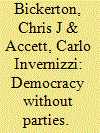

|
|
|
|
|
| Publication |
2014.
|
| Summary/Abstract |
This article looks at the legacy of 'Berlusconism' for Italian politics. On the right, we identify a process of fragmentation. As a result of the personalised leadership of Silvio Berlusconi, where loyalties and ties were to il cavaliere as an individual rather than to a party or a political tradition, there is little by way of legacy on the right. Surprisingly, we find that Berlusconi's greatest legacy lies on the left of Italian politics, in the figure of Matteo Renzi. In his savvy manipulation of the media and in the careful construction of his own image, accompanied by a non-ideological set of political slogans, Renzi has gone even further than Berlusconi. As a result, he may be the one to final bury Italian 'party government' and all its associated traditions and ideals.
|
|
|
|
|
|
|
|
|
|
|
|
|
|
|
|
| 2 |
ID:
142004


|
|
|
|
|
| Summary/Abstract |
Contrary to mainstream thinking, the existence of diversity does not necessarily condemn a state to instability and chaos. In fact, difference is a good ingredient for progress because each group contributes its unique experiences and peculiar qualities to the cause of a nation. To produce crisis, diversity must be worked on or manipulated. With a view to gaining deeper understanding of the factors that impact on identity diversity to create conflict in Nigeria, a number of conflict theatres in the country were examined. Having explored each case, the article notes that the policies of the colonial state, that emphasised group differentiation, laid the foundation for identity conflicts. The post-colonial state is just as guilty. Its administrative arrangement for managing diversity, the federal character principle (FCP), has failed to exploit the country’s diversity to produce development. Instead, it has deepened the isolation of certain groups, thus, inhibiting national integration. Added to the deliberate manipulation of diversity for personal interests by the political class, the incidence of identity conflicts in the country can be explained. Going forward, the author stresses the need to review the FCP and close all loopholes in its enabling laws that allow for easy misinterpretation and deliberate misapplication.
|
|
|
|
|
|
|
|
|
|
|
|
|
|
|
|
| 3 |
ID:
132942
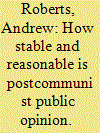

|
|
|
|
|
| Publication |
2014.
|
| Summary/Abstract |
The quality of democracy depends on both politicians and citizens. While most attention has focused on politicians, this paper looks at citizens. There has been some scepticism about whether the postcommunist public is prepared to rule their countries. The legacies of communism and the rigours of the transition may have produced citizens whose opinions are unstable and ill-informed and therefore a poor basis for democratic policy making. This paper tests this proposition by considering the nature of public opinion in the Czech Republic. Its main conclusion is that postcommunist public opinion is more reasonable than conventional wisdom suggests. Opinions on most policies change slowly if at all and when they do change the changes are prompted more by gradual shifts in mores than by political manipulation. This suggests that citizens in the region are prepared to have a significant voice in policy making.
|
|
|
|
|
|
|
|
|
|
|
|
|
|
|
|
| 4 |
ID:
127068
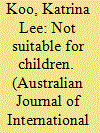

|
|
|
|
|
| Publication |
2013.
|
| Summary/Abstract |
The 2001 conflict in Afghanistan has attracted a great deal of international controversy. The impact of the conflict on Afghanistan's children has been no exception. The research conducted by the United Nations and child protection organisations on the experiences of Afghan children throughout the conflict paints a bleak picture. Accounts of children being directly targeted, accidently killed, abducted, actively fighting in armed groups, denied humanitarian assistance or simply struggling to be healthy, happy, educated and secure amid this conflict are a reminder that conflict devastates children's lives. However, while this research demonstrates that children are often war's innocent victims, the ways in which this research is narrated, particularly by belligerent parties to the conflict, are far from innocent. This article examines the political manipulation of research on Afghan children affected by armed conflict. It argues that Afghan children and their experiences have become a powerful moral symbol that is used by belligerents to advance political, military and strategic agendas.
|
|
|
|
|
|
|
|
|
|
|
|
|
|
|
|
| 5 |
ID:
074830
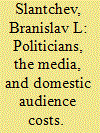

|
|
|
|
|
| Publication |
2006.
|
| Summary/Abstract |
Domestic audience costs can help leaders establish credible commitments by tying their hands. Most studies assume these costs without explaining how they arise. I link domestic audience costs to the citizens' ability to sanction the leadership for pursuing a policy they would not want if they had the same information about its quality. How can citizens learn about policy quality? I model two information transmission mechanisms: one potentially contaminated by politically motivated strategic behavior (leader and opposition), and another that is noisy and possibly biased (media). In equilibrium, audience costs can arise from strategic sources only in mixed regimes under relatively restrictive conditions, and cannot arise in autocracies or democracies. However, in democratic polities the media can play a mitigating role and does enable leaders to generate audience costs. Still, their ability to do so depends on the institutional protections guaranteeing freedom of the media from political manipulation. Domestic audience costs are not necessarily linear in regime type, as often assumed in applied research.
|
|
|
|
|
|
|
|
|
|
|
|
|
|
|
|
| 6 |
ID:
128224
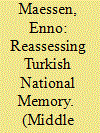

|
|
|
|
|
| Publication |
2014.
|
| Summary/Abstract |
In this article continuity and discontinuity of interpretations and manipulations of national memory during the successive governments of the Adalet ve Kalk?nma Partisi (Justice and Development Party - AKP) in Turkey are investigated. The strong continuities between the Islamist parties of the 1990s and the AKP, with regard to the way they consider and manipulate Ottoman history as a means of political legitimation, are demonstrated. In addition, the continuity between the AKP's style of governance and that of preceding governments is shown. The conclusion of the article is that, in addition to continuities with its Islamist predecessors, the AKP is to a large extent still embedded within the boundaries of the nationalist framework set out by Kemalism with regard to the party's stance on Turkish citizenship, national identity, traumas in national history and leader-centred politics.
|
|
|
|
|
|
|
|
|
|
|
|
|
|
|
|
| 7 |
ID:
114340
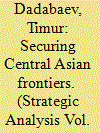

|
|
|
|
|
| Publication |
2012.
|
| Summary/Abstract |
This article develops the message that the artificially introduced administrative borders during the Soviet era, which were subject to the processes of re-delimitation after 1991, whether for reasons of security, administration, mutual distrust or the population's ethnic attachment, have become results and means of political manipulation and pressurisation. This has resulted in further pushing regional states to follow mutually exclusive policies. Although for most of these states, border delimitation is not an objective but a declared way of achieving their security, the process of delimitation detailed below casts doubts on whether border delimitation, even if successful, would actually mean increased security for the region under the prevailing conditions of unilateralism and mutual distrust.
|
|
|
|
|
|
|
|
|
|
|
|
|
|
|
|
| 8 |
ID:
137755
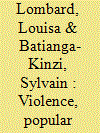

|
|
|
|
|
| Summary/Abstract |
People seeking to understand the scope and scale of violence in the Central African Republic over the past two years have cited a variety of social grievances centring on the political manipulation of religion, belonging, and access to opportunities. Without denying that these factors have played a role, this article argues that the violence must be understood in the context of social practices of violence that long predate the war, especially in light of the diffuse and non-centralized mode of organization through which the ongoing war has played out. The article focuses on the prevalence of popular punishment and vengeance, which have long histories as elements of statecraft in the CAR and have become even more widespread amid the generalized insecurity and anomie that have set in over the past few decades. The article presents evidence of the workings of popular punishment from the intra-family level to that of the crowd and quartier, in both rural and urban locales. Though people have important reservations about popular punishment, they also see vengeance as an important tool for enforcing a circumscribed mode of empathy and a minimum set of standards for social behaviour. These experiences in the CAR suggest that those wishing to understand how wartime mobilization happens must consider not just fighters' grievances but also people's conceptions of the practical and symbolic efficacy of vengeance and popular punishment as elements of politics and the management of threats.
|
|
|
|
|
|
|
|
|
|
|
|
|
|
|
|
|
|
|
|
|